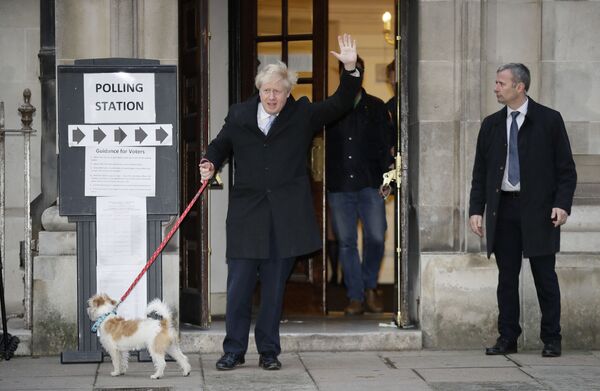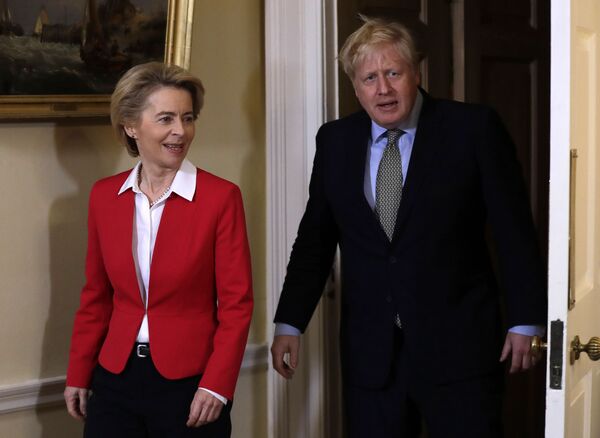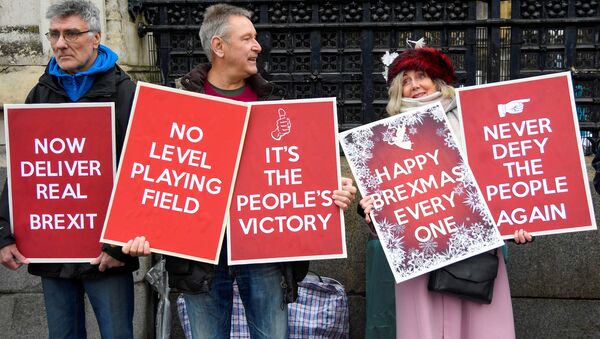The news could come as a potential blow to British Prime Minister Boris Johnson, whose aim is to negotiate a so-called “bare bones” trading framework whereby the UK would largely rid itself of Brussel’s red tape, while limiting any potential economic damage.
But given that Brussels appears to be taking a hardball stance towards talks once again, is a no-deal Brexit now a real possibility, and could the EU be inadvertently pushing the UK into closer political and economic alignment with the US and President Donald Trump’s administration?
Journalist Marcus Stead reflects on the matter.
Sputnik: Will the UK be able to negotiate a mutually beneficial trade deal with the EU by the end of 2020?
Marcus Stead: The UK’s negotiating stance will be very different now compared to the two years with Theresa May, she was a remain supporter during the 2016 referendum, and she seemed to regard Brexit as a damage limitation exercise.
We ought to remember that Boris Johnson hedged his bets before the 2016 referendum, he wrote two newspaper articles; one in favour of remain and the other in favour of leave, and only decided at the last minute which one was to be published.
He backed the leave side much to the astonishment of then Prime Minister David Cameron, but Mr Johnson won his majority at last months’ general election with a clear commitment to get Brexit done, there is no wriggle room out of that.
Johnson’s team will go into these negotiations believing Brexit to be an opportunity. Their approach will be that, while it would be good to have a positive future trading relationship with the EU, but that must not be at the expense of being able to strike trade deals with the wider world.

One note of caution is that Mr Johnson and his team will need to be aware of Blairites in the officially neutral civil service, who may well try to undermine negotiations in the months ahead, and when the EU is negotiating with Johnson and his team, they will do so under a very different dynamic.
Johnson’s government has a House of Commons Majority of eighty, so there will be no more tight votes, and the government will have absolute authority, they will force the EU to behave in a very different way to the past two years.
There will have to be certain red lines. Issues such as worker’s rights in the UK are matters to be decided by the duly elected House of Commons, not unelected bureaucrats in Brussels, and Boris Johnson’s team has made it abundantly clear that these negotiations must be concluded by December.
This date is important because even if negotiations don’t go well; the business world can handle bad news a lot better than it can handle uncertainty, and it’s necessary to keep that deadline, because we as a country need to move on, and it’s that uncertainty that is holding business back and delaying investment.
As the EU has a long summer break, the bulk of the work will have to be done by the early summer, so It can be ratified in the autumn, but one trap Boris Johnson’s team need to be wary of, is that the EU may well try to force the UK to accept free movement of people, in return for single market access.
Controlling immigration is one of the key benefits of Brexit, and sacrificing it is not a red line worth crossing, but from the EU’s point of view; they won’t want to make leaving look easy or appealing, as anti-EU sentiment is growing fast in other countries throughout the bloc, and it knows that this project to build a single European state, is in trouble.
Sputnik: Could Brussels’ hardball stance towards the Brexit negotiations push the UK into seeking closer alignment with the USA, both politically and economically?
Marcus Stead: It does seem as though Boris Johnson is trying to ride two horses at the moment, in that whilst negotiations with the EU might not start until March; he does appear ready to start negotiations with President Trump’s administration immediately.
Trump has been saying that it would be a good idea to get the basis of this done by the summer because of course he’s up for re-election in the autumn, but in the UK itself, the one concern I do have is the lack of a credible opposition.
There’s a real disconnect between Labour Party members and its heartland voters. The membership base has been changed beyond all recognition in the last four years, and it largely consists of middle-class students, their lecturers and others who are preoccupied with the dogma of this “woke” agenda, and a mythical climate emergency.
Even now they seem obsessed with stopping Brexit at all costs, and that puts them at odds with the party’s traditional heartlands who’ve backed the party for a century, until the recent general election.
The Labour leadership contest candidates at the moment seem to think that the electorate needs a good telling off for not backing them, rather than taking time to listen and to understand why people abandoned them, which is largely because they felt ignored on Brexit.

Sputnik: Would a no-deal Brexit be as bad as many critics claim?
Marcus Stead: I do believe that there would be significant short term disruption in terms of supply and food, and other goods; but it’s not going to be this apocalypse scenario that project fear has been describing for many years.
I cannot think of a single item of food or drink that could not be sourced from outside the EU if necessary, however, supply lines and the way supermarkets operate in particular could mean that there would be a shortage of certain goods in the short term, whilst those supply lines are realigned.
Within a matter of months that could, however, be sorted out. There could be other problems as well, for example; the vast majority of Formula One teams are based around the area near Silverstone Race Track, and the deal that allows them to get all their machinery and parts out of the country would not be in place.
The other thing, of course, is that these talks have to be concluded by December, which is Boris Johnson’s own deadline, and therefore if it becomes clear that the UK is heading for a no-deal Brexit; then business can already start to prepare.

